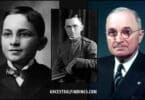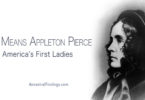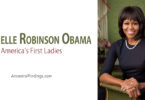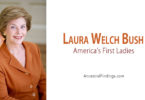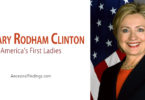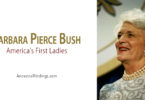Born February 13, 1885, in Independence, Missouri, Elizabeth “Bess” Wallace would one day become the wife of 33rd US President Harry Truman. Her parents were David Wallace and Margaret Gates. She had three younger brothers and was known as a tomboy during her childhood. She knew her future husband from childhood, as Harry’s family moved to Independence when Bess was still a little girl, and they attended school together. After high school, she went to Kansas City, Missouri, to attend Miss Barstow’s Finishing School for Girls, to learn how to be a “proper” young lady for the times.
When Bess was 18, her father committed suicide in the family bathtub by shooting himself in the head. The reasons for this are still not known. Historians have speculated on everything from depression to increased debts he could not pay. Bess herself seems to have not known the reason, either.
Harry continued to court Bess during all this time, essentially making the transition from a good childhood friend to boyfriend without much fanfare. He proposed to her in 1911, when she was 26 years old, but she turned him down. Harry then went off to fight in World War I and told her he intended to propose again when he returned. However, he also added that he wanted to be making more money than he made at his current occupation of a farmer before he asked for her hand once more.
Harry and Bess eventually married on June 28, 1919, when Bess was 34 years old. They were wed at the Trinity Episcopal Church in Independence, Missouri. Their only child, a daughter named Margaret, was born six years later.
Harry was elected a US Senator from Missouri in 1934, and he, Bess, and Margaret all moved to Washington, D.C. As the wife of a Senator, Bess tried to make herself useful. To that end, she joined the Congressional Club, the H Street United Service Organization, and joined in the Red Cross volunteer work of the Senate Wives Club. She also worked for Harry as a clerk, where she answered his personal mail and edited the committee reports he wrote when he was chosen as Chairman of the Senate Special Committee to Investigate the National Defense Program.
When Harry became US President suddenly, on the death of President Franklin Roosevelt during his unprecedented fourth term in office, Bess was not pleased. She did not want to be First Lady. She barely tolerated being Second Lady when Harry was Vice-President to Franklin Roosevelt. Bess hated the publicity, limited privacy, and scrutiny of her and her family’s personal life that came with being First Lady. She was a private person and had hoped to keep it that way. As First Lady, she did only the bare minimum of what was expected of her in that office, and, unlike her vivacious predecessor Eleanor Roosevelt, kept mostly to herself and did not make public comments or appearances unless it was absolutely necessary or expected.
And, Bess held only one press conference during her tenure as First Lady, whereas Eleanor Roosevelt established a precedent for holding many. The only reason Bess gave for even giving this one conference was that the press kept hounding her to do it until she finally gave in. When she did do the press conference, it consisted of written questions given to her in advance, and her answers were mostly one-syllable ones, such as “Yes” or “No.” Sometimes, she said, “No comment.” When asked if she would ever want her daughter to be President, Bess got a little more creative with her answer and said, “Most definitely not.”
When asked why she did not want to speak to the public, Bess answered that it was not she who was elected to office. Therefore, she had nothing to say to the public. All she wanted to do was to get through her time as First Lady and return to Independence, where she could live quietly, away from the spotlight.
She was mostly absent from public functions during Harry’s presidency, except for those at which tradition dictated she absolutely be there. When forced to act as White House hostess, Bess did so graciously and with politeness and good manners, and her parties and dinners were known as good, respectable ones that people enjoyed.
Bess had several honorary chairmanships of different organizations as First Lady, but her participation was non-existent or minimal, and the chairmanships were offered only as a courtesy to her because of her title.
When Harry left office, he and Bess returned to their home in Independence, Missouri, as she wished. Harry spent time working on his memoirs and presidential library, while Bess enjoyed spending time with her daughter and grandchildren. In 1959, she had a mastectomy to remove a large, but benign, tumor from her breast, and spent some time recovering from that experience, which she fully did. When President Lyndon Johnson signed Medicare into law in 1965, Harry and Bess were its first recipients.
It appears that Bess may have had anti-Semitic tendencies. In 1961, when reporter David Susskind did a series of interviews with Harry in Independence, Harry always took David to his presidential library to talk to him. When David asked why Harry had not invited him to his home, Harry replied that his house was Bess’s house, and by her wish, there had never been and would never be a Jewish guest in it. David was Jewish.
When Harry died in 1972 at the age of 88, they were the oldest former First Couple to ever have occupied the White House. Bess spent the next decade at her home in Independence, living quietly as she preferred, and enjoying spending time with her family. When she died in 1982 at the age of 97, she was, and still is, the longest-lived former First or Second Lady of the United States. She was buried beside Harry in a private funeral at his presidential library in Independence.

